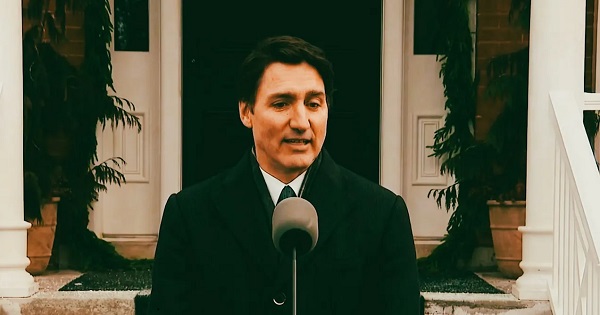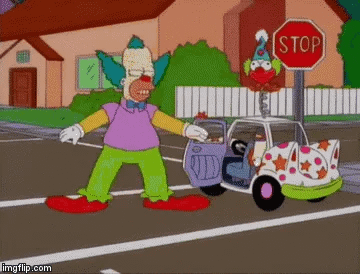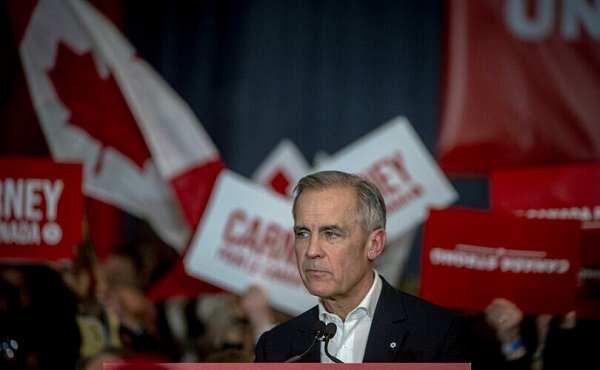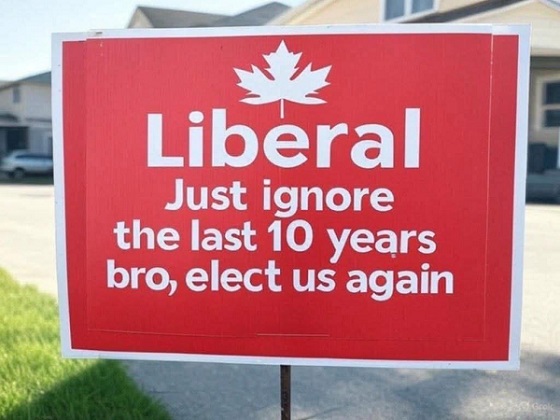National
Justin Trudeau Resigns as Prime Minister

Amid scandals, internal dissent, and economic mismanagement, Trudeau steps down after nearly a decade in power, triggering a leadership race and questions about his legacy
Justin Trudeau has finally called it quits, but let’s not pretend it was on his terms. After nearly a decade of virtue-signaling, reckless spending, and scandals so frequent they could be a Netflix series, Trudeau announced his resignation in a press conference dripping with self-pity and self-praise. But let’s cut through the melodrama: Trudeau isn’t resigning out of some noble desire to “reset” Canadian politics. He’s running for the hills, leaving behind a Liberal Party in chaos, a country divided, and a fiscal crisis that would make any economist break into a cold sweat.
To make his exit smoother—and less humiliating—Trudeau has cooked up one final trick to save his party from immediate disaster. He’s proroguing Parliament until March 24th, giving the Liberals time to select a new leader while avoiding a vote of no confidence that every opposition leader is salivating over. The Conservatives, NDP, and Bloc are all chomping at the bit to hold Trudeau’s government accountable for its incompetence, scandals, and economic mismanagement. And who can blame them? The Liberal government has been teetering on the edge of collapse for months, paralyzed not by opposition obstruction, as Trudeau claims, but by its own refusal to release critical documents on multiple corruption scandals. Trudeau’s prorogation stunt isn’t about giving Canada a “fresh start”—it’s about running out the clock to save his party from political obliteration.
According to Trudeau, he’s stepping down because Parliament has been “paralyzed” by polarization. That’s rich. The truth is, Parliament hasn’t been paralyzed by some abstract cultural divide. It’s been paralyzed by Trudeau’s government refusing to release critical documents about scandal after scandal. Whether it’s the “Green Slush Fund,” where taxpayer dollars were funneled to companies tied to Liberal insiders, or the endless dodging around the Auditor General’s damning reports, Trudeau’s government has been allergic to accountability. Opposition parties haven’t obstructed Parliament—they’ve been doing their job, demanding transparency. But Trudeau, ever the master deflector, wants you to believe it’s all just partisan bickering.
And let’s not forget the real catalyst for this resignation: Chrystia Freeland’s departure. Trudeau would have you think they parted on amicable terms, with him heaping praise on her as a “political partner.” The reality? Freeland’s resignation letter all but called him out for fiscal irresponsibility. She didn’t leave because of some grand philosophical difference with Trudeau. She bailed because she was left holding the bag for his government’s staggering $64 billion overspending scandal.
Freeland, as Finance Minister, was supposed to break the bad news to Canadians, delivering the grim truth about how the Trudeau government had torched billions on pet projects, virtue-signaling initiatives, and bloated programs under the guise of “building back better.” But when she got wind that Mark Carney—the darling of the globalist elite—was being tapped as her eventual replacement, her calculus shifted. Why should she be Trudeau’s scapegoat, taking the fall for his disastrous economic management, when she could jump ship and salvage her political reputation?
So, she bolted, leaving Trudeau scrambling to spin her departure as amicable, even noble. The truth is far less flattering. Freeland wasn’t some hero standing up to Trudeau’s fiscal insanity; she was an opportunist who saw the writing on the wall and decided to save herself. Her timing says it all. Trudeau was ready to throw her under the bus, make her the face of his government’s economic collapse, and Freeland, ever the political survivor, wasn’t about to go down with the ship.
In the end, Trudeau and Freeland are two sides of the same coin. One ran Canada’s economy into the ground while insisting it was all for the greater good, and the other bailed the moment she saw an opportunity to escape the consequences. Trudeau’s resignation and Freeland’s exit don’t mark the end of an era—they mark the unraveling of a failed administration that has left Canada worse off than it was a decade ago.
But it doesn’t end there because Justin Trudeau’s resignation wasn’t just an end to his tenure—it was a ghost story. Lurking in the background of his carefully choreographed farewell was the unmistakable shadow of Stephen Harper, the former Conservative Prime Minister Trudeau loved to blame for just about everything. Even as he stepped down, Trudeau couldn’t resist invoking the specter of his political nemesis, indirectly justifying his decision to prorogue Parliament by comparing it to Harper’s 2008 decision to do the same.
Trudeau attempted to spin his prorogation as necessary, claiming Parliament had been paralyzed by obstruction and filibustering. But anyone paying attention knows that Trudeau’s move was about avoiding immediate accountability. Facing confidence votes in a chaotic minority government, with scandals piling up and his party splintering, Trudeau needed an out. And who better to use as cover than Harper, the so-called architect of prorogation?
But here’s the irony Trudeau can’t escape: while he used to condemn Harper’s leadership style as cynical and divisive, his own legacy isn’t much different. Harper prorogued Parliament to avoid a confidence vote he was likely to lose, a move that Trudeau’s Liberals once decried as undemocratic. Yet here we are, with Trudeau proroguing Parliament not to “reset” anything, but to buy his party time to regroup while avoiding a vote that could collapse his government.
Trudeau’s comparisons to Harper don’t stop there. Harper governed during a time of economic challenge and left behind a reputation for fiscal conservatism. Trudeau, on the other hand, presided over the largest spending spree in Canadian history, resulting in ballooning deficits and rising inflation. But as Trudeau exits, what’s striking isn’t how different he is from Harper—it’s how much he’s been defined by him. Harper’s economic competence looms large over Trudeau’s fiscal recklessness. The ghost of Harper isn’t just haunting Trudeau’s resignation—it’s casting a long shadow over his legacy.
Even in his final moments as Prime Minister, Trudeau’s insecurities about Harper were on full display. By proroguing Parliament and framing his exit as a principled move to “cool tensions,” Trudeau essentially admitted he couldn’t handle the same parliamentary pressures Harper navigated with ease. In the end, Trudeau wasn’t escaping Harper’s legacy; he was living in it. His inability to outrun that ghost may be one of the most revealing aspects of his resignation.
The sad part here folks is that Trudeau’s press conference wasn’t just self-serving—it was a masterpiece of revisionist history. He bragged about reducing poverty and helping families, but here’s what he left out: food bank visits in Canada hit over 2 million in March 2024, a 90% increase since 2019. Housing costs are through the roof, inflation is crushing families, and his beloved carbon tax has made basic necessities even more expensive. Sure, he’ll point to child poverty stats that improved thanks to government handouts, but the broader picture shows a nation where economic insecurity is the new normal. That’s not a success story—it’s a disaster.
And then there was the inevitable swipe at Pierre Poilievre, the Conservative leader who’s been eating Trudeau’s lunch on the political stage. Trudeau called Poilievre’s vision “wrongheaded” and accused him of wanting to abandon climate change initiatives and attack journalists. Translation: Poilievre has been relentless in exposing Trudeau’s failures, and Trudeau doesn’t like it. Canadians don’t care about your climate summits and woke talking points, Justin—they care about being able to afford groceries and pay their rent. That’s why Poilievre is surging, and why Trudeau is getting out before he faces electoral humiliation.
Of course, Trudeau tried to paint his departure as some grand act of self-awareness. He claimed, “If I’m having to fight internal battles, I cannot be the best option in the next election.” How noble! Except those “internal battles” are the direct result of his own arrogance and incompetence. His party is in shambles, his government is mired in scandal, and he knows he can’t beat Poilievre. This isn’t a gracious exit—it’s a calculated retreat.
So what’s next for Canada? Justin Trudeau’s resignation sets the stage for a Liberal leadership race that will be as chaotic and cynical as his entire tenure. Whoever steps up will inherit not just a fractured party, but a country battered by division, corruption, and fiscal mismanagement. The swamp Trudeau cultivated—the elites, insiders, and bureaucrats who thrived under his reckless governance—will scramble to maintain control, ensuring their grip on power even as Canadians demand real change. But this time, the people might not be so easily fooled.
Pierre Poilievre and the Conservatives are ready to step in with a message that cuts through the noise: affordability, accountability, and putting Canadians first. They’re tapping into the frustration of a country that’s tired of being lectured by a Prime Minister who spent more time virtue-signaling on the world stage than solving the real issues facing Canadians at home. Families struggling to pay for groceries, veterans waiting for basic services, and Indigenous communities still boiling water don’t want more of the same—they want a government that works for them. Trudeau saw the writing on the wall, and he ran.
Justin Trudeau leaves office cloaked in the same smug self-congratulation that defined his years in power. He’ll undoubtedly retreat to cozy speaking circuits and elite gatherings, spinning his tenure as a tale of progress and leadership. But Canadians won’t forget. They won’t forget the skyrocketing cost of living, the erosion of free speech, the scandals swept under the rug, or the divide-and-conquer tactics he used to cling to power. Trudeau governed not for the people, but for the swamp—a cadre of insiders, globalists, and bureaucratic elites who put their interests above those of ordinary Canadians.
This resignation isn’t a reset—it’s a retreat. Trudeau knows the Liberals can’t win under his leadership, so he’s abandoning ship, leaving the mess for someone else to clean up. But the Canadian people are waking up. They see through the empty promises and self-serving platitudes. They’re ready to drain the swamp and restore a government that respects their values, their freedom, and their future.
Trudeau’s resignation isn’t the end of a chapter; it’s the start of a fight. The fight to reclaim Canada from the grasp of a corrupt and unaccountable elite. The fight to put the interests of hardworking Canadians ahead of the woke agenda. The fight to restore pride, prosperity, and unity in a country that deserves so much better than the mess Justin Trudeau is leaving behind. Canada is ready for real leadership. And the swamp should be very, very afraid.
2025 Federal Election
The status quo in Canadian politics isn’t sustainable for national unity

From Energy Now

William Lacey

The Willful Blindness of the East
That’s it. I’m officially a separatist…sort of. Really, I’m just completely tired of Ontario and Quebec. After 10 years of frozen economic output, a runaway immigration program, and a debt profile that went hyperbolic, Eastern Canada appears to have decided that another four years of the same old, same old is a good path forward.

In short, they think that the clown car that led this country, after just swapping out the driver (who happened to be one of the people who was supplying the directions), is a good idea.

Having been born and raised in Alberta, I feel that there is a significant amount of the battered spouse syndrome that is alive and well in the province, with people saying “I know the rest of the country love me. They’re just having a bad day.” No matter how many times I ask “what’s in this great union for Alberta” I get the same kitschy feedback. Be grateful for Canada and its social programs and “free” medical system (they are broken), Canada in the Great War (umm…that was 107+ years ago), great moments in sports, tidewater access (umm….that’s a quiet threat), etc. When it comes to one tangible answer, I just get silence. But the reality is that the East is perfectly happy to look down their noses, take the money, and then say “you are not one of us; you lack provenance!” Now some of you may say that is bullshit and that Albertans are an ungrateful bunch. But being someone who has lived in both the East and West, and worked with people who come from all walks, I know firsthand the bias exists.
Alberta, and the West, have made outsized contributions to confederation, much of that through the system that we call equalization. The idea behind this system was so that all parts of Canada get equal treatment through the taxation system, taking funds generated by “have” provinces and redistributing those funds to “have not” provinces, making sure that all are afforded the basics that Canadians have taken to be their definition of Canada. This is essentially done by looking at the fiscal capacity of each province, based on the average national tax rate, and then “balance” the books based on this average capacity. And that’s fine. But in the world I live in, when one group reaches out and helps the other, there is an acknowledgement of the effort, not a “va te faire foutre!” like comes out of Quebec. There is a certain irony from the chart below that it looks like Quebec is giving the finger to the rest of the country.

The reality is that the East views it as beneath them to say thank you for such a contribution. Moreover, many go out of their way to vilify the work that is done and to demean those who do it. So you wonder why the frustration mounts? The fact of the matter is that I believe that the Conservative movement has been codified out East as a fringe movement, only to be voted for when the Liberals need a brief time out.
Do I think separation is a real possibility? Not really. There are numerous challenges, some of which are more difficult than others. The largest one is probably related to indigenous matters, but they too likely suffer from a version of battered spouse syndrome. There is an underlying tenet that the Federal Government cares for them, but based on what I have seen, that is a unique “standard of care” that is being applied. I actually believe that better outcome for the indigenous people could be achieved under a new relationship, assuming both sides were open minded.
Now before you say “you are on the fringe, you don’t represent the masses”, I can tell you that I know a lot of people who are leaders in their professions within this province, whether that is health, law, business, etc. that all echo these feelings. The frustration is palpable, it is real and it is broader than you think.
So, with this I finally raise my hand and make the call that “I’m tired of the relationship I am in.” This pains and saddens me deeply, as I am someone who has worn the maple leaf with great pride and who has been happy to pronounce “I am Canadian.” I think it’s time to reconsider who I view as my partner.
2025 Federal Election
RCMP memo warns of Chinese interference on Canadian university campuses to affect election

From LifeSiteNews
The Royal Canadian Mounted Police singled out China as the only nation of interest, noting that the ‘threat posed by the People’s Republic and its powerful security and intelligence apparatus’ remains a ‘concern.’
An internal briefing note from Canada’s top police force warned that agents of the Communist Chinese Party (CCP) are targeting Canadian universities to intimidate them and in some instances challenge them on their “political positions.”
The December 3, 2024, memo titled On-Campus Foreign Interference from the Royal Canadian Mounted Police (RCMP) did not mention specific universities by name but noted that foreign interference was sophisticated and came solely from China.
The memo stated that as Canada’s academic institutions rely on “open, creative and collaborative environments” to foster independent debate, some “foreign intelligence services and government officials including the People’s Republic of China can exploit this culture of openness to monitor and coerce students, faculty and other university officials.”
“On university campuses foreign states may seek to exert undue influence, covertly and through proxies, by harassing dissidents and suppressing academic freedoms and free speech that are not aligned with their political interests,” the RCMP noted in the memo.
The memo noted that foreign agents’ influence in “public debate at academic institutions” may lead to them sponsoring “specific events to shape discussion rather than engage in free debate and dialogue.”
“They may also directly or indirectly attempt to disrupt public events or other on-campus activities they perceive as challenging their political positions and spread disinformation, undermining confidence in academic discourse and expertise,” the memo observed.
Notably, the memo singled out China, and thus the CCP, as the only nation of interest, noting that the “threat posed by the People’s Republic and its powerful security and intelligence apparatus including malign activities targeting our democratic institutions, communities and economic prosperity” remains a “concern.”
Some of the activities that foreign agents engaged included the recruitment of CCP sympathizers and “in some instances,” noted the memo, saw students be “pressured to participate in activities that are covertly organized by a foreign power.”
“Universities can also be used as venues for ‘talent spotting’ and intelligence collection in specific circumstances,” the memo stated.
The final report from the Foreign Interference Commission concluded that operatives from China may have had a hand in helping to elect a handful of MPs in both the 2019 and 2021 Canadian federal elections. It also concluded that China was the primary foreign interference threat to Canada.
According to hearings from a 2021 House of Commons Special Committee on Canada-China Relations, there were numerous documented incidents of CCP intimidation.
For example, a Tibetan Canadian, Chemi Lhamo, testified she got death threats after she ran for student council president at the University of Toronto’s Scarborough campus.
“There were comments saying the bullet that would go through me was made in China,” she said, noting that “Community members of the allied nations who are subjected to the Chinese Communist Party’s colonial violence are not alien to these tactics. We have witnessed China’s interference and influence not just in our university campuses but also in our communities.”
Earlier this week, LifeSiteNews reported that Canada’s Security and Intelligence Threats to Elections Task Force (SITE) confirmed the CCP government was behind an online “operation” on WeChat to paint Prime Minister Mark Carney in a positive light.
Canadians will head to the polls in a general election on April 28.
LifeSiteNews reported last week that the Liberal Party under Carney, has thus far seen no less than three MP candidates drop out of the election race over allegations of foreign interference.
LifeSiteNews recently reported how the Conservative Party sounded the alarm by sharing a 2016 video of Carney saying the Communist Chinese regime’s “perspective” on things is “one of its many strengths.”
As reported by LifeSiteNews, a new exposé by investigative journalist Sam Cooper claims there is compelling evidence that Carney and former Prime Minister Justin Trudeau are strongly influenced by an “elite network” of foreign actors, including those with ties to China and the World Economic Forum.
-

 conflict2 days ago
conflict2 days agoZelensky Alleges Chinese Nationals Fighting for Russia, Calls for Global Response
-

 2025 Federal Election2 days ago
2025 Federal Election2 days agoAn In-Depth Campaign Trail “Interview” With Pierre Poilievre
-

 2025 Federal Election2 days ago
2025 Federal Election2 days agoHarper Endorses Poilievre at Historic Edmonton Rally: “This Crisis Was Made in Canada”
-

 John Stossel1 day ago
John Stossel1 day agoGovernment Gambling Hypocrisy: Bad Odds and No Competition
-

 2025 Federal Election1 day ago
2025 Federal Election1 day agoMark Carney pledges another $150 million for CBC ahead of federal election
-

 Alberta1 day ago
Alberta1 day agoAlberta’s embrace of activity-based funding is great news for patients
-

 2025 Federal Election2 days ago
2025 Federal Election2 days agoWATCH: Massive Crowd for Historic Edmonton Poilievre Rally
-

 2025 Federal Election19 hours ago
2025 Federal Election19 hours agoCommunist China helped boost Mark Carney’s image on social media, election watchdog reports











